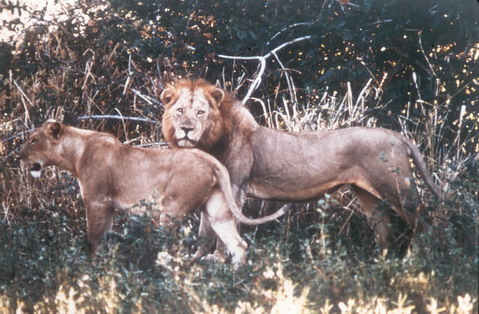So kids," I say, dragging out a kindly voice from my schoolteaching days and turning to the children seated behind me in the four-wheel drive, "which animal do you most want to see on safari?"
We're about to leave Lilongwe, the capital of Malawi, and head across the Zambian border for a five-day safari in remote South Luangwa National Park, and have just met the British family of five who will be our companions on the trip. Rosie, 10, answers first: "Elephants and hippos and zebras and giraffes."
At 12, Josh is more decisive. "Wild dogs," he says, choosing one of the rarest, most elusive carnivores in all Africa.
Sam, who is 8, has his nose buried in the latest Harry Potter book. His head is too full of hocus-pocus at Hogwarts to give a definitive answer, but the African wilderness is about to create its own magic - for all of us.
Our cheerful guide Ben, from Land and Lake Safaris swings up into the big Land Cruiser and we're soon chewing up the kilometres towards the border. Once in Zambia, the going is slow, hot and dusty as we negotiate 100km of rough dirt road, passing through forests and scattered villages of thatched huts where villagers stop to watch the unfamiliar vehicle bounce by. It's fascinating, but everyone sighs with relief when Ben says we're nearing our lodge.
Rosie gets one of her wishes before we even arrive when we jolt around the final corner to find the track blocked by a herd of elephants.
The rigours of the drive melt away as we sit in awe, watching them use their dextrous trunks to tear at trackside trees before they amble off into the bush.
On arrival at the lodge, strange noises draw us to a bank overlooking the Luangwa River. Several large crocodiles bask on a sandbar in the middle. Just below us the nostrils, eyes and ears of a dozen hippos are visible above the murky water. Every so often a hippo surfaces, opening its cavernous mouth to let out a mournful bellow, a sound that becomes synonymous with our stay.
South Luangwa covers 9050sq km, with the twisting course of the Luangwa River at its heart. This seldom-visited park has one of Africa's highest concentrations of game, so with that in mind we retire early to get a decent sleep before our first game drive. The hippos and the trill of myriad insects and frogs disturb our slumber, as do elephants cavorting in the overflow from the nearby water tank and ripping at low trees right outside our window.
Still, lack of sleep doesn't dull our anticipation and we set off at sunrise, wrapped up well against the chilly African morning.
Just over the bridge into the park our safari guide, Flemings, opts to take one of the smaller trails.
We've been on it only two minutes when someone whispers loudly, "Wild dogs".
Everyone looks sceptical, but Flemings obligingly reverses our customised open-top vehicle and noses off the track, crunching through the thick undergrowth. Sure enough, there in a clearing, six wild dogs are devouring an impala they've just killed, their white-tipped tails wagging furiously and their mottled coats stained with blood.
The dogs, also known as Cape hunting dogs or painted wolves, aren't going to give up their kill because of us so we're able to edge in close.
In the tall, tawny grass we spy a spotted hyena greedily eyeing the dogs' meal. He tries to slink in beside them but is smartly chased away, with a sharp nip thrown in for good measure. Soon the dogs have had their fill and lope away, bloodied tongues lolling as they run. Immediately, the hyena moves in, making short work of the carcass as his powerful jaws crunch through bones and skull.
So Josh gets his wish with the unexpected sight of the endangered dogs and a scavenging hyena.
It will remain a highlight, but there are many more to come. During our stay we have three lion encounters, one of which involves a lonely lioness stalking a handsome male and another female. While we're engrossed watching the pair in front she sneaks alongside us, using the vehicle as a shield.
The British children's mother, Louise, gasps as the lioness passes within centimetres of Rosie, who has opted to sit in the door-less passenger seat.
But the lioness moves on to confront the other lions. The angry male snarls and lunges, chasing her behind a tree where she curls up sadly like a rejected kitten. The last we see of them, the single lioness is watching forlornly from a rock as the pair saunter away across a dry watercourse.
Later we come across a herd of about 600 Cape buffalo and, when we stop near a waterhole for morning tea, a dozen zebra step down to drink - nervously watching us as well as the hippos and crocs. Giraffes, elephants, zebra and warthogs regularly cross our path and impala become so commonplace that we barely notice them.
We do notice the incredible variety of birds and with Flemings' help we are soon able to identify gorgeous lovebirds, weird ground hornbills, various water birds, kingfishers and birds of prey.
South Luangwa has a good population of leopards and during night safaris we hope that the powerful spotlight will pick up one of the big cats. It doesn't, but we see other nocturnal creatures, including genets and civets, mongooses, hares, hyenas, and hippos that have come out of the water to graze.
Our final great experience comes at the last sunset of the trip when we stop to watch the blazing red ball sink below the forest.
In the river behind us hippos moan and groan, while in front of us three enormous elephants materialise out of the trees and stroll across the open ground. All of our safari wishes have come true.
http://www.nzherald.co.nz/section/7/story.cfm?c_id=7&objectid=10505200

No comments:
Post a Comment